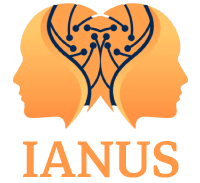During its first year, the IANUS partners organised three stakeholder workshops with a diverse group of prominent societal experts from various disciplines. The aim has been to map the landscape of trust in science and its underlying forces and attractors, as well as to receive input towards the project’s activities.
The consultation workshops took the form of interactive exercises preparing the ground for the interaction and co-creation activities of IANUS. Specific attention was meant to focus on public- private partnerships and their effect on public opinion, co-involving the advisory board.
Workshop I and Workshop II were organised as in-person workshops in Soeterbeeck, Netherlands, and Workshop III as an online workshop.
Workshop I “WORKSHOP I – COOPERATIVE DISCOURSE TO MAP THE LANDSCAPE &
PARAMETERS PERTAINING TO ‘TRUST IN SCIENCE’ was organised as a ‘cooperative discourse’-debate, aiming to better define the reasons for and characteristics of trust and distrust in science. For that reason, the invited experts were asked to join one of two breakout groups (i.e. (1) Agent ‘Trust’, or (2) Agent ‘Distrust’), in order to prepare the arguments that were likely to be used by each group for the subsequent debate. Workshop results overall acknowledged that science (as a discipline) had both fostered the discussion on trust/distrust in science, and inadvertently allowed triggers for mistrust to occur (e.g. overclaiming of impacts, identification of rogue scientists).
Workshop II “SCENARIO- & ANALYSES-PLANNING BASED ON HISTORICAL
CASE-STUDIES” aimed to look at the topic of trust and distrust in science in light of three specific scenarios, based on the (historical) case studies conducted in IANUS (i.e. past cases, in which scientific topics have been discussed in public and evoked (dis)trust). In particular, the preliminary results of historical IANUS Case-Studies on ‘Genome Editing’ and ‘Artificial Intelligence’ were presented, in order to provide the experts with an overview of the data available (e.g. survey data), analyses done, and parameters taken into consideration.General discussions that took place stressed that ‘trust’ could be understood as a default state, while ‘distrust’ is the outcome of a learning process or an experience that moves the original trustee away from fully trusting; the result can be a total distrust, or a case-specific distrust. In this context, it may be better to talk about ‘confidence’, instead of trust.
Workshop III “FOLLOW-UP & GAP DISCUSSION” aimed to review the intermediate results of the first two workshops. The discussion centred around seven broad themes: communications, social media, science and the political arena, representations of the public, the changing university research environment (social) value and ethics, and systemic issues.
Overall, the IANUS stakeholder workshops provided several interesting insights. In particular, the expert discussions suggested that there is confidence and trust in science and scientists, while the Mertonian description of the ethos of the scientific enterprise is subject to challenges in contemporary times. Some suggestions for future research were also made, namely in relation to investigating specific examples of STIs and identifying the common denominators of success and failure, and recognising that the trust issue is the outcome of contemporary systemic limitations in politics, governance and science.
